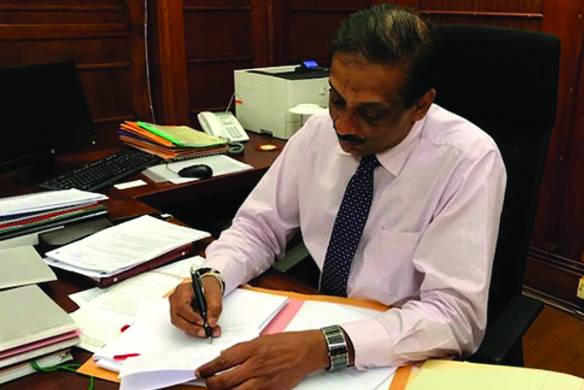Treasury Secretary S.R. Attygalle yesterday said that the upcoming special single Goods and Services Tax (GST) which is one of the major proposals in 2021 Budget will be either revenue neutral or positive as the rate will be determined prior to its implementation from January.
On Tuesday in presenting the 2021 Budget, Prime Minister and Finance Minister Mahinda Rajapaksa proposed to improve the efficiency of tax collection through the introduction of an online-managed single Special Goods and Service Tax.
This new tax will be in place of the various goods and service taxes and levies, imposed under multiple laws and institutions on alcohol, cigarettes, telecommunication, betting and gaming and vehicles, which accounts for 50% of the income from taxes and levies. If going by 2020 estimated tax revenue of Rs. 1,357 trillion the proposed new GST amounts to Rs. 679 billion.
“It is expected through this reform to direct institutions under special legislation such as the Excise Ordinance to have a more focused regulatory engagement in facilitating the Government to secure its revenues otherwise lost through sale of illicit alcohol and cigarettes,” Rajapaksa said.
Speaking at the Ernst & Young post-Budget webinar, Attygalle said that the new GST will be brought under the Finance Act from 1 January 2021. “We are yet to finalise the rate and the detailed mechanisms but I can assure you it will be either revenue neutral or positive,” Treasury Secretary said, recalling past experience in similar changes such as removing NBT on imports and switching it to PAL or reduction in VAT but adjusting upward revision in excise duties.
“It is an efficient tax,” Attygalle said, given the fact that it will be an e-Tax and that, for example, Excise Department instead of being preoccupied in collecting taxes and levies from 17 hard liquor bottlers and two malt producers can focus on nabbing the illicit trade and increase revenue.
Currently, the telecommunication services are subject to Telecommunication Levy, Cess (administered by the Telecommunications Regulatory Commission) and VAT (administered by the Department of Inland Revenue).
The telecommunication industry first witnessed the composite tax called Telecommunication Levy in lieu of VAT and NBT in 2011. Later, in 2016, VAT and NBT were reimposed on the telecommunication industry in addition to the Telecommunication Levy. NBT was discontinued from December 2019.
For motor vehicles, a composite tax was introduced in 2014, on motor vehicles specified under Chapter 87 of the tariff guide for both import and supply of such vehicles in lieu of VAT and NBT. In addition to the composite tax, Custom Duty and Port and Airport Development Levy is imposed at the point of importation.
Further, Luxury Tax on Motor Vehicles was introduced in 2019 in lieu of Annual Luxury Motor Vehicle Tax on prescribed motor vehicles. ESC imposed on importation of motor vehicles w.e.f. April 2017 was discontinued from January 2020.
Cigarettes and liquor are currently subject to Excise Duty and VAT. A composite tax was introduced in 2014 for cigarettes and liquor in lieu of VAT and NBT. However, VAT and NBT was reintroduced from November 2016 on cigarettes and liquor in addition to the Excise Duty imposed. NBT was discontinued from December 2019.
Currently, the business of betting and gaming is subject to an annual levy for carrying on the business of gaming and a levy on gross collection of the business. Further, a Casino Entrance Levy is imposed and collected from the persons entering such places of gaming.
(FT)

